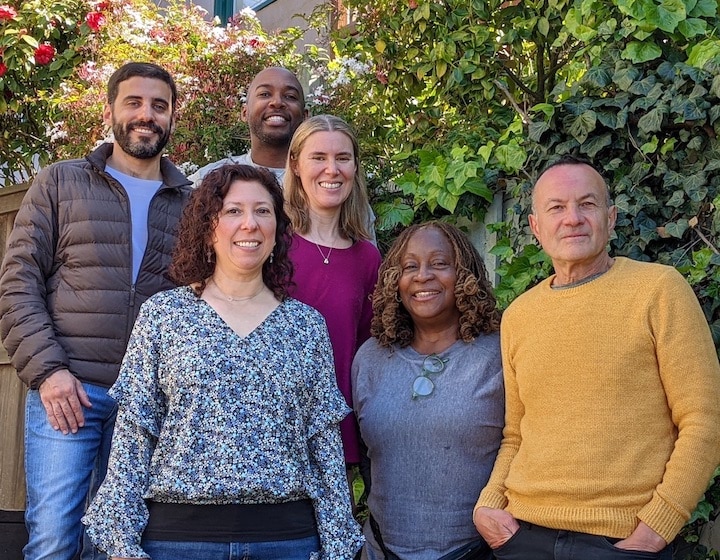University of California, San Francisco Prevention Research Center
Populations of Focus: African American men, LGBTQ+ people, transgender women
Topic Area: HIV health disparities
Introduction, Mission, and Vision

UCSF PRC works to eliminate HIV-related health disparities in communities disproportionately affected by HIV.
The University of California, San Francisco Prevention Research Center (UCSF PRC) is one of 26 Prevention Research Centers (PRCs) supported by the Centers for Disease Control and Prevention (CDC) for the 2019–2024 funding cycle. Each PRC is funded to establish and maintain their center and to conduct a core research project. PRCs may receive supplemental funding to conduct additional research projects and activities.
UCSF PRC’s mission is to improve public health by addressing leading causes of preventable illness and improving health outcomes for populations experiencing substantial and preventable health disparities. It seeks to understand the social, structural, psychological, and mental health mechanisms that drive the HIV epidemic.
To support this mission, UCSF PRC develops, adapts, and promotes effective HIV prevention strategies and health resources that can be shared at individual, organizational, community, and policy levels. By translating its research into practice, UCSF PRC can have a lasting, positive effect on health outcomes. The goal is for these efforts to contribute to existing public health research and for effective prevention interventions to be adopted into public health practice and policy.
Core Research
Each PRC uses a community-engaged approach to conduct one primary applied public health prevention research project called a core research project. Project activities include design, development, implementation, evaluation, and dissemination. PRCs use at least 50% of their CDC funding to conduct the project in partnership with communities.
UCSF PRC’s core research project for the 2019–2024 funding cycle seeks to achieve health equity for transgender women by using the RE-AIM framework to translate the Healthy Divas intervention into practice in West Oakland, California. Healthy Divas was originally developed at UCSF to provide gender-affirming care for transgender women living with HIV.
Working with the California Prostitutes Education Project (Cal-PEP), UCSF PRC is adapting the intervention to address HIV stigma and serve all transgender women, regardless of HIV status. Cal-PEP has been serving communities in Oakland for 33 years, focusing on communities of color and people with HIV. UCSF PRC’s expertise in implementation science and Healthy Divas and Cal-PEP’s expertise in serving communities in Oakland combine to make this a unique, timely, and critical opportunity to study real-world implementation of this intervention.
The result of this collaboration is the Healthy Divas Learning Center which has information for anyone who wants to adopt Healthy Divas at their organization, clinic, or agency. Resources include:
- Strategies to prepare your intervention team and organization
- Ideas for getting funding
- Sample recruitment materials
- Staff job descriptions and supervision guidance
- Healthy Divas intervention manual and training videos
Additional Research
PRCs may receive supplemental funding to work on additional research projects each funding cycle. These Special Interest Projects (SIPs) focus on a variety of health topics or gaps in scientific evidence. PRCS can also conduct additional research as part of SIP Thematic Research Networks, which are groups of PRCs working together on related health topics.
Electronic Health Record Study to Examine Factors and Diagnostic Pathways that Facilitate Early Ovarian Cancer Diagnoses
This SIP will study factors that facilitate earlier ovarian cancer diagnosis, including where and how patients are diagnosed within the healthcare system, timelines, and symptoms, using electronic health record data from institutions linked to state cancer registry data and data on the neighborhood environment.
PRC Vaccine Confidence Network (PRC VCN)

The UCSF PRC is a team of investigators focused on improving public health through health promotion and prevention. Beginning in Spring 2021, UCSF PRC was funded to explore vaccine uptake with Black/African American and Latinx youth, parents and their children in San Francisco and Alameda counties.
In April 2021, CDC funded a 12-month award to all 26 PRCs to form the PRC VCN in support of the agency’s Vaccinate with Confidence strategy for COVID-19. As part of this network, UCSF PRC is examining vaccine hesitancy to find ways to promote vaccine confidence, increase vaccine uptake, and reduce disparities in Black and Latinx communities. The goal is to reduce the incidence of COVID-19 in the United States.
UCSF PRC is collaborating with several community-based organizations to implement and evaluate targeted strategies to increase vaccine confidence in the communities of focus. Its partners include the San Francisco Department of Public Health, Alameda County Public Health Department, San Francisco YMCA, and Mujeres Unidas y Activas.
The Impact of Psychological Factors on Patient-reported Outcomes Among Individuals with Lupus
This SIP study will assess the relationship between psychosocial factors (such as food insecurity, discrimination, stress, and traumatic experiences) and patient-reported outcomes (such as fatigue, physical function, and perceived cognitive functioning) in people with lupus. It will identify modifiable factors that may improve patient-reported outcomes.
Developing and Evaluating Adolescent, Parent, and Provider Resources to Improve Adolescent Use of Sexual Health Services
This SIP will develop a technology-based intervention to increase the use of confidential sexual health services by strengthening partnerships between adolescents, parents, and health care providers. The long-term objective is to promote lifelong behaviors that support young people’s health and well-being—including behaviors that reduce their risk of sexually transmitted diseases, HIV, and unintended pregnancy.
Nutrition and Obesity Policy Research & Evaluation Network (NOPREN)
As the Coordinating Center for this network, UCSF PRC advances the science of nutrition policy by providing strategic direction and support across the network and its work groups. It also fosters network collaboration, helps build capacity for the next generation of nutrition policy researchers, promotes information sharing, and coordinates and hosts monthly webinars on nutrition policy. NOPREN is housed in the UCSF Center for Vulnerable Populations.

Location: San Francisco, California
Principal Investigator: Greg Rebchook, PhD